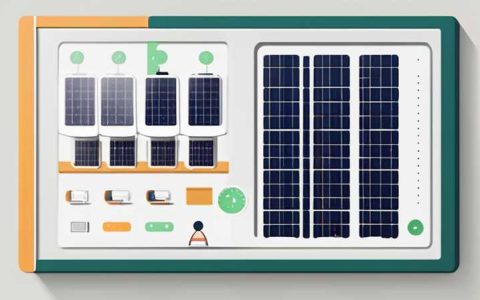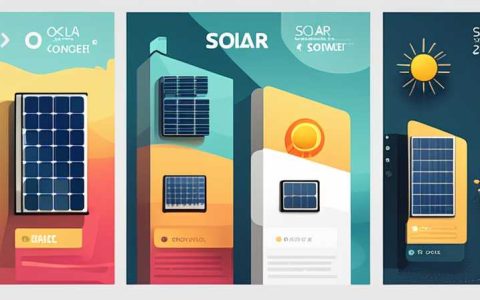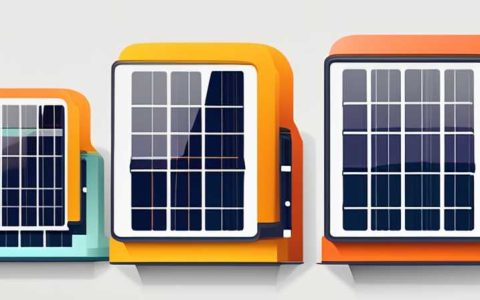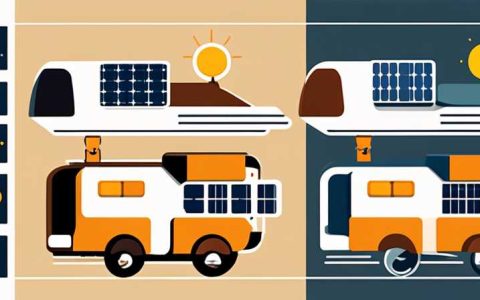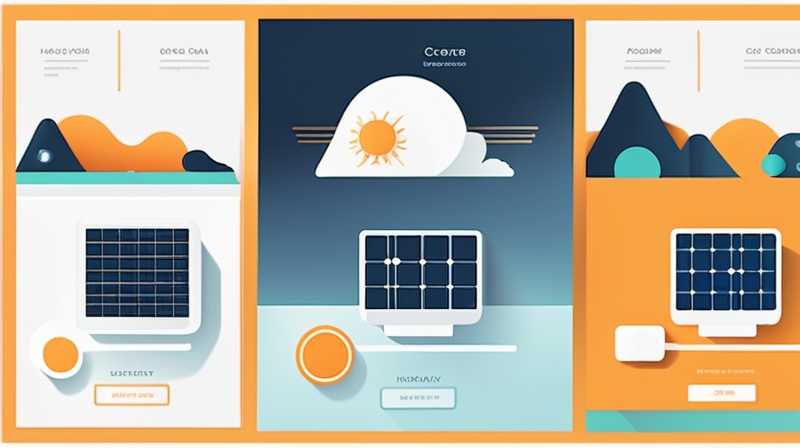
Solar energy powers a myriad of devices and technology, impacting various sectors and everyday life. 1. Solar panels converting sunlight into electricity, 2. Solar water heaters providing hot water efficiently, 3. Solar-powered appliances like lights and chargers, 4. Solar vehicles utilizing renewable energy for transportation. One critical aspect of solar energy is its ability to harness a limitless resource for sustainable living. This reduces dependence on fossil fuels and promotes eco-friendly innovations that benefit society both economically and environmentally.
1. UNDERSTANDING SOLAR ENERGY
Solar energy refers to the harnessing of sunlight and converting it into usable electricity or heat. This particular form of energy is derived from the nuclear fusion reactions that occur in the sun’s core. Solar panels, made up of photovoltaic (PV) cells, are designed to absorb sunlight and convert it into electricity. This technology has advanced significantly since its inception, and the growing demand for renewable energy has accelerated innovations in solar energy solutions.
The essence of solar energy lies in its sustainability. Unlike fossil fuels, which are limited resources contributing to environmental degradation, solar energy is abundant and inexhaustible, making it a viable option for sustainable energy solutions across various sectors. With global concern over climate change and the depletion of natural resources, solar energy stands out as a crucial alternative that can significantly reduce carbon footprints.
2. SOLAR PANELS AND THEIR APPLICATIONS
2.1. Residential Solar Systems
A prominent application of solar energy is the integration of solar panels into residential properties. Homeowners increasingly invest in these systems to generate clean electricity for personal use. Solar systems vary in size, ranging from small units powering individual appliances to larger installations capable of meeting all energy needs of a home. The advantages of utilizing residential solar panels are manifold, including reduced electricity bills and increased property value.
Moreover, utilizing domestic solar energy fosters self-sufficiency. Homeowners who install solar panels often have the opportunity to feed excess energy back into the grid, contributing positively to the local power supply and potentially receiving compensation. This symbiotic relationship allows homeowners to participate actively in the energy market while promoting cleaner, renewable energy.
2.2. Commercial Solar Solutions
On a larger scale, businesses and industrial facilities have begun to adopt solar energy solutions as a means to cut operating costs. Commercial solar installations can yield considerable savings in electricity expenses and offer companies a way to enhance their corporate social responsibility efforts. Incorporating solar technology aligns with a growing consumer preference for sustainability and eco-friendly practices.
Additionally, many governments provide incentives for businesses to make the shift towards solar energy. These incentives may come in the form of tax credits, rebates, or grants, making solar installations more financially attractive. Overall, moving towards solar energy presents a significant opportunity for companies to position themselves as leaders in sustainability while reaping economic benefits.
3. ENERGY STORAGE AND SOLAR TECHNOLOGY
3.1. Batteries for Solar Energy Storage
Energy storage technology, particularly battery systems, plays a crucial role in maximizing the benefits of solar energy. Batteries allow for the capture of excess energy generated during sunny periods, which can be utilized during the night or on overcast days. This feature addresses one of the significant limitations of solar energy: its dependency on weather conditions and daylight availability.
Various types of batteries are available, including lithium-ion and lead-acid batteries, each with different capacities and lifespans. Homeowners and businesses that invest in energy storage solutions gain greater control over their energy consumption. They can reduce reliance on the grid, avoid peak pricing, and ensure a continuous power supply, enhancing energy resilience.
3.2. Off-Grid Solar Solutions
For remote areas or regions without reliable access to the power grid, off-grid solar solutions provide a practical alternative. These systems are entirely independent, relying solely on solar panels and storage batteries to meet energy demands. Such configurations are particularly valuable in developing countries where traditional energy infrastructure may be lacking.
Off-grid solar systems can power a variety of applications, such as lights, refrigeration, communication devices, and irrigation pumps. By adopting off-grid solar technology, communities can significantly improve their quality of life while simultaneously promoting sustainable energy practices that align with global efforts towards a greener future.
4. SOLAR-POWERED APPLIANCES AND GADGETS
4.1. Solar Lighting Solutions
Solar-powered lighting is a transformative application of solar energy, particularly in outdoor settings and areas lacking electrical infrastructure. Solar streetlights are increasingly deployed in urban environments to illuminate streets and enhance safety while reducing energy costs. These lights operate autonomously, relying on integrated solar panels to gather energy during the day, which powers LED bulbs at night.
In residential settings, solar garden lights, pathway lights, and security lights provide convenient and eco-friendly options for landscaping and home security. The ease of installation and lack of wiring requirements make these solar lighting solutions particularly appealing for homeowners looking for sustainable outdoor features.
4.2. Solar Chargers and Small Devices
The growing prevalence of solar chargers exemplifies the versatility of solar energy in everyday technology. These chargers harness sunlight to provide energy for smartphones, tablets, and other portable devices. Solar chargers appeal to outdoor enthusiasts, travelers, and anyone seeking renewable energy solutions on the go.
With advancements in technology, solar chargers have become more efficient and compact, allowing users to access solar energy conveniently. This trend reflects a larger consumer movement towards sustainable living, making solar-powered devices an attractive option for reducing environmental impact while maintaining connectivity and convenience.
5. SOLAR THERMAL TECHNOLOGIES
5.1. Solar Water Heating Systems
Solar thermal systems are specifically designed to utilize solar energy for heating water, making them an efficient alternative to conventional water heating methods powered by fossil fuels. Such systems typically consist of solar collectors, which absorb sunlight, and storage tanks to house the hot water generated. By harnessing the sun’s energy, households and businesses can significantly reduce their water heating costs.
Several models of solar water heaters exist, including direct, indirect, and batch systems. Each model varies in complexity and efficiency, but they all offer substantial savings on energy bills and reduce the carbon footprint associated with traditional water heating methods.
5.2. Solar Pools and Spa Heating
Beyond residential water heating, solar technology extends to recreational facilities, such as swimming pools and spas. Solar pool heaters enable users to harness sunlight to maintain comfortable water temperatures, extending the swimming season while minimizing energy expenses. Pool owners can benefit from this installation as it not only reduces heating costs but also provides an environmentally friendly alternative.
As the demand for outdoor heating solutions increases, solar pool heating systems become more relevant. These systems can be installed in both residential and commercial pools, exemplifying the flexibility and adaptability of solar technologies across different environments.
FAQs
WHAT TYPES OF ITEMS USE SOLAR ENERGY?
A broad array of items utilizes solar energy, encompassing residential appliances, commercial solutions, and innovative technologies. Residentially, products such as solar panels convert sunlight into electricity, providing homeowners with sustainable energy for their daily needs. Solar water heaters efficiently harness thermal energy for hot water production. Additionally, various solar-powered gadgets, including chargers and lights, exemplify how individuals incorporate solar energy into everyday life. In commercial applications, businesses employ solar energy solutions to enhance cost efficiency while contributing to environmental sustainability.
HOW DOES SOLAR ENERGY BENEFIT THE ENVIRONMENT?
The environmental benefits of solar energy are extensive and impactful. Unlike fossil fuels, which emit greenhouse gases contributing to climate change, solar energy production generates no direct emissions, significantly reducing the carbon footprint. Furthermore, solar energy systems promote cleaner air and water, mitigating pollution commonly associated with traditional energy sources. Transitioning towards solar energy can enhance biodiversity, safeguarding ecosystems from the adverse effects of fossil fuel extraction and consumption. Ultimately, adopting solar energy plays a vital role in fostering a healthier planet.
CAN SOLAR ENERGY BE USED IN ALL CLIMATES?
Solar energy technology can be utilized in diverse climates, although its effectiveness may vary depending on geographical location and seasonal conditions. While sunlight availability is more consistent in sunny regions, solar energy systems can also function effectively in areas with overcast skies or snowy conditions. Advances in solar technology, such as improved photovoltaic cells and energy storage solutions, enhance their performance regardless of weather conditions. Despite varying degrees of solar energy generation, systems remain a viable renewable energy solution across a broad spectrum of climates.
CLOSING THOUGHTS
The significance of solar energy is paramount in the contemporary world as it offers a solution to many global challenges. Utilizing solar technology can facilitate a shift toward sustainable living, providing an array of solutions for residential, commercial, and industrial applications. Harnessing solar power not only mitigates the reliance on fossil fuels but also promotes economic benefits through reduced energy costs and increased property values. In addition, solar technologies enhance energy independence, allowing individuals, businesses, and communities to manage their energy resources more effectively. The versatility of solar energy is further accentuated by the development of innovative products, from solar panels to lighting and water heating solutions. Solar energy presents an avenue for individuals and organizations to play a part in combating climate change and promoting a greener future. Each adoption of solar technology contributes to the collective effort toward a more sustainable planet, empowering societies to make informed and responsible energy choices. As the world moves forward, the continued investment in and utilization of solar energy solutions will be imperative to building resilient and environmentally conscious communities.
Original article by NenPower, If reposted, please credit the source: https://nenpower.com/blog/what-items-use-solar-energy/


